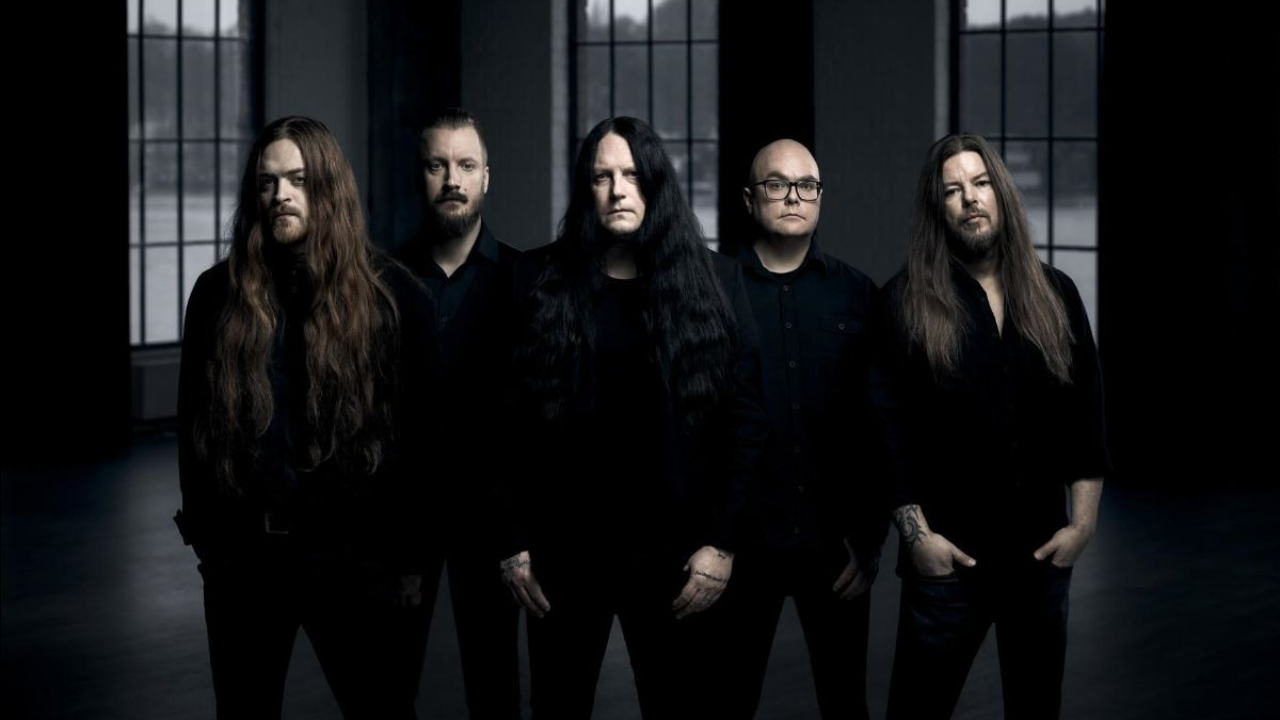Trivium's track-by-track guide to The Sin And The Sentence
Matt Heafy and Paolo Gregoletto break down the new Trivium album The Sin And The Sentence track by track

Trivium are releasing their eighth full-length The Sin And The Sentence on October 20, and it’s nothing short of a return to form, harking back to the heavier, more frenzied music we fell in love with on Ascendancy and In Waves. In the new issue of Metal Hammer (and on TeamRock+) we talk to frontman Matt Heafy and bassist Paolo Gregoletto about rediscovering their aggression and (more importantly) voice after Matt’s vocal surgery.
To give a deeper understanding of the new record, and the band’s experiences that fed into it, we sat down with Matt and Paolo to go through The Sin And The Sentence track by track.
The Sin And The Sentence
Paolo: “I was really interested in the culture online of people piling on people. I was trying to think of the culture we’re in now, but using the metaphor of the witch hunts, with the line: ‘Beware those who speaks in tongues for they may call your name’. Meaning, beware being a part of this culture, because it could be you on the receiving end of that at some point. You’re one tweet away from changing your life. Coming up with the title, The Sin And The Sentence, I had to riff, and I was on a plane, listening to it over and over and over again, and that phrase came into my head. It fit perfectly.”
Beyond Oblivion
Paolo: “Corey was scrolling through his TV guide and he saw the phrase ‘Beyond Oblivion’ on a show, and wrote it down. I felt like I could make that work for a chorus, so I had to think of a theme of what that would be. I was listening to a bunch of podcasts about artificial intelligence, but they were comparing the idea of the coming technology to the atomic bomb – of how we created this incredibly immense, dangerous world-destructing thing in a moment when no one was really thinking of the implications. The song was viewing it from the perspective of someone that creates this sort of technology and comes to view it for what it is.”
Other Worlds
Paolo: “The way the world’s been with all the elections, the climate, it feels like it’s ratcheted up out of nowhere over the last few years. Online, people you thought you knew well begin acting and doing things a certain way which really were uncharacteristic. And I kind of felt like that, being on Facebook. One day I woke up and I’m like, ‘Know what? Fuck this site, and fuck all these people. Why are we on here every day arguing with each other about shit?’ I was really angry so I deleted it. But it sat with me for a little bit, and that was sort of the inspiration of the song – feeling like you’re literally detached from people that you thought you know.”
The Heart From Your Hate
Paolo: “I was reading up on this backstory about these Japanese American troops in World War II that had some of the most brutal battles, and meanwhile their family was in America in Japanese internment camps. The federal government rounded them up because they looked like the enemy that they were fighting. And I’m like, ‘This is insane to think about – these guys are literally dying and fighting for a country that’s locked up their families at home.’ The whole thing is, what does it take to prove you’re one of us. And that is powerful to us. If my family was locked up, I wouldn’t fight for the country, and that was really inspiring to read about those stories. But I didn’t think it would be easy to translate that, so we boiled it down further: what would it take for you not to hate someone? Would it take them dying for you, or their family dying, or being locked up? But I think the core of it is how hard it is to change people’s minds when they hate something, or when they hate someone.”
Betrayer
Matt: “Paolo sent us all the song and I fell in love with it musically right away. It was the end of the tour, and I had just come out of a really bad ending of a really good friendship – someone I consider one of my really close friends, someone that I had helped in their time of need, they’ve helped me in my time of need. And I felt like I really was a good influence on this person that was addicted to bad things, doing bad things. And it completely soured when they turned their back on me and all of us, and I remember sitting on that flight and being so choked up with anger. I just put my headphones on, put the song on, and immediately started writing the lyrics. There’s a word in there, ‘creonte’. It’s a Brazilian-Portuguese word that’s passed around in Brazilian Jiu Jitsu gyms, and it means ‘traitor’. It’s when someone was part of your gym, and they leave for an unknown reason, and join a rival gym.”
Metal Hammer Newsletter
Sign up below to get the latest from Metal Hammer, plus exclusive special offers, direct to your inbox!
- How Trivium started to write The Sin And The Sentence
- Fighting talk: How Trivium got their voice back
- Our TeamRock+ offer just got bigger. And louder.
- Trivium - The Sin And The Sentence album review
The Wretchedness Inside
Matt: “It was originally ghost-written for another band, a modern metal band, and they ended up not using it for some unknown reason. Paolo helped me revamp it. It shows off our modern metal and metalcore, hardcore roots. It’s about being addicted to a bad situation, knowing it and not being willing to get out of it, but recognising it. Abusive relationships, abusive friendships, toxic addiction, something like that. When you pop out and have a moment of clarity and a moment of consciousness, and you’re like, ‘Why am I in this, this is terrible for me, I need to get out’, and you just hop back in. It’s the idea of Stockholm syndrome, something like that, in a song.”
Endless Night
Matt: “I have a friend who owns a personal training company, and he asked me to score their yearly video for their trainers. I was like, ‘Oh yeah, sure. Piece of cake.’ I had been doing scoring stuff for local businesses, local real estate companies, food trucks, these little things in Orlando. So I said, ‘What do you want?’ And he said, ‘Something like Dying In Your Arms’. Alright, that’s easy. I did this thing, sent it to him, he loved it. I showed the guys, and they were like, ‘This is really good, we should use it for Trivium.’ So again, we all reworked it together, and Paolo did all the lyrics.”
Sever The Hand
Matt: “I sent it through to Paolo, and he said it had the same structure as one of the other songs. He was like, ‘Make this song structure unexpected.’ So I just rearranged it. And it’s super weird. It’s actually a combination of two songs – one song had that middle section, that was a different song, and the rest was another. It has a little bit of everything – that pre-chorus sounds like something off Ember To Inferno, the middle section to the beginning sounds like something off The Crusade. That opening riff is played like a metalcore band would, but has the high notes of a black metal band, thrash parts, punkish, – it’s everything.”
Beauty In The Sorrow
Paolo: “Musically, most of the riffs in the song kind of stayed the same, but once I figured out where it was going to go lyrically, we were able to shape it a lot more. I listened to this guy, Dan Carlin; he had a podcast called Hardcore History. It was 16 hours, it was crazy, tons of episodes, all about World War I, and I was so drawn into this. I had read a book not long before, called Beauty And The Sorrow, and that was about World War I. It was about personal lives of people involved all around this huge, calamitous thing, and a lot of the stories were built through their letters. It’s different, because we never really took a subject like that and made it into a Trivium song.”
The Revanchist
Paolo: “I kept seeing this word in a lot of news articles I was reading: revanchist. And describing religion and different things, describing something like a ‘real revanchist’. And it was like, what is this word? When I looked it up, the first thing that came up was a literal definition of revanchist being about the French taking back some sort of reclaimed territory they had fought or something. I guess maybe it’s used interchangeably with someone being described as a reactionary. I don’t know if I was trying to do it from the viewpoint of a person, or just the idea of the word of a revanchist – reclaiming and promising this past glory, this thing that you can reclaim, and only this person can bring it to you, and through them you’ll find this promised land and this past that I’m selling you or promising. It feels like in history, any time there’s been these points, there’s always people that are looking back to this imagined past, like it was much better at this one point. I feel like it’s very insidious; it’s a dark way to think.”
Thrown Into The Fire
Matt: “Corey had written this mid-paced song initially. This is when we had pretty much all the songs done. I said, ‘We don’t need simple – the last record was simple and slow and middle-paced, let’s go full-on extreme. Think about God Dethroned, think about Vital Remains, think about Dimmu Borgir, think extreme, think blackened death metal.’ What I love about that chorus is it reminds me of a mixture of black metal, death metal, but also metalcore. It’s kind of like a breakdown, so it’s kind of like Behemoth would do in one era, but kind of like something Bury Your Dead could do too. And I’m not saying we’re thinking about those bands, but I love the fact we have all these different genres that can live inside our band.”
You can read the full story on Trivium’s new album in the latest issue of Metal Hammer – on sale now. Buy it directly here or become a TeamRock+ member to read it right now.

Eleanor was promoted to the role of Editor at Metal Hammer magazine after over seven years with the company, having previously served as Deputy Editor and Features Editor. Prior to joining Metal Hammer, El spent three years as Production Editor at Kerrang! and four years as Production Editor and Deputy Editor at Bizarre. She has also written for the likes of Classic Rock, Prog, Rock Sound and Visit London amongst others, and was a regular presenter on the Metal Hammer Podcast.
